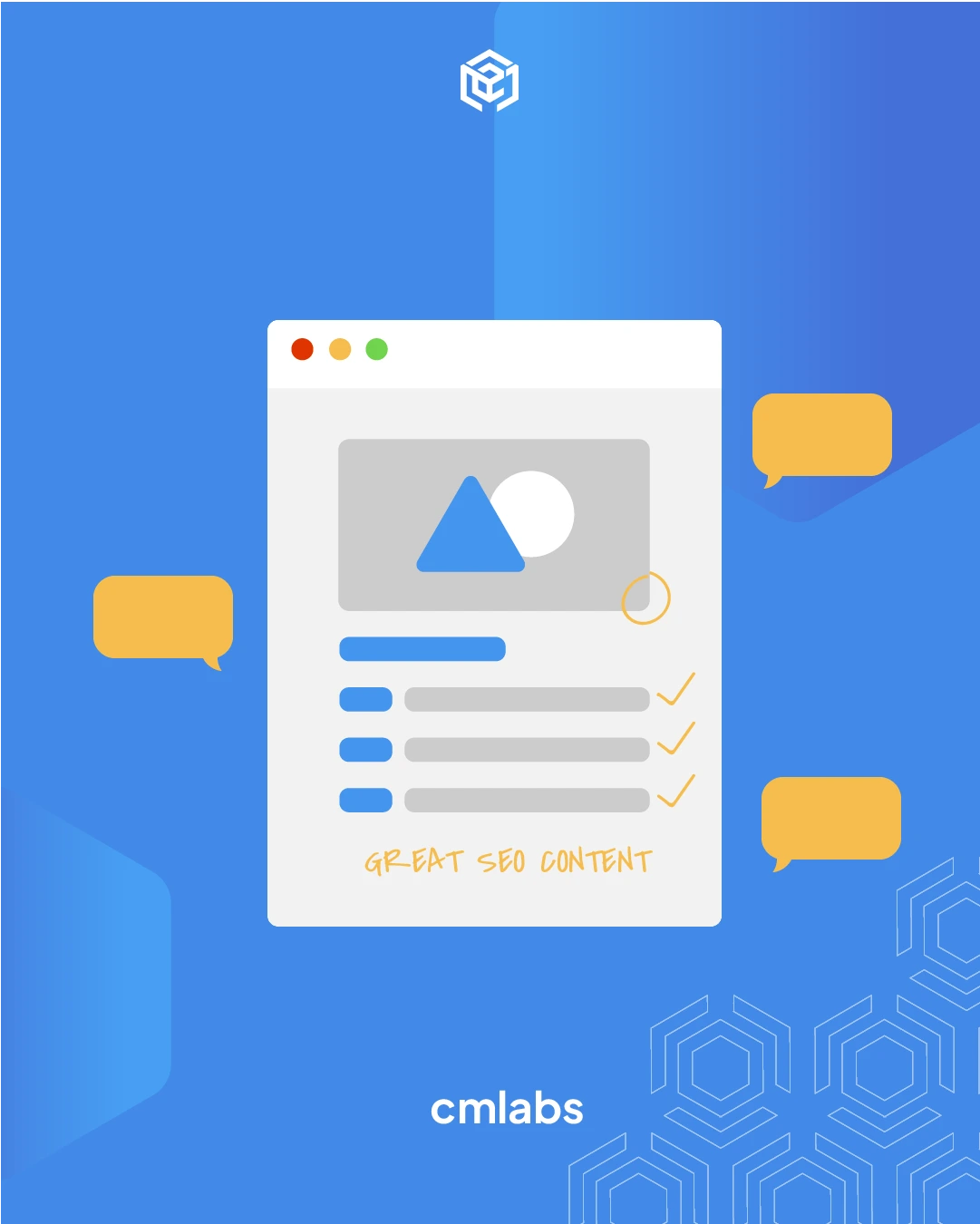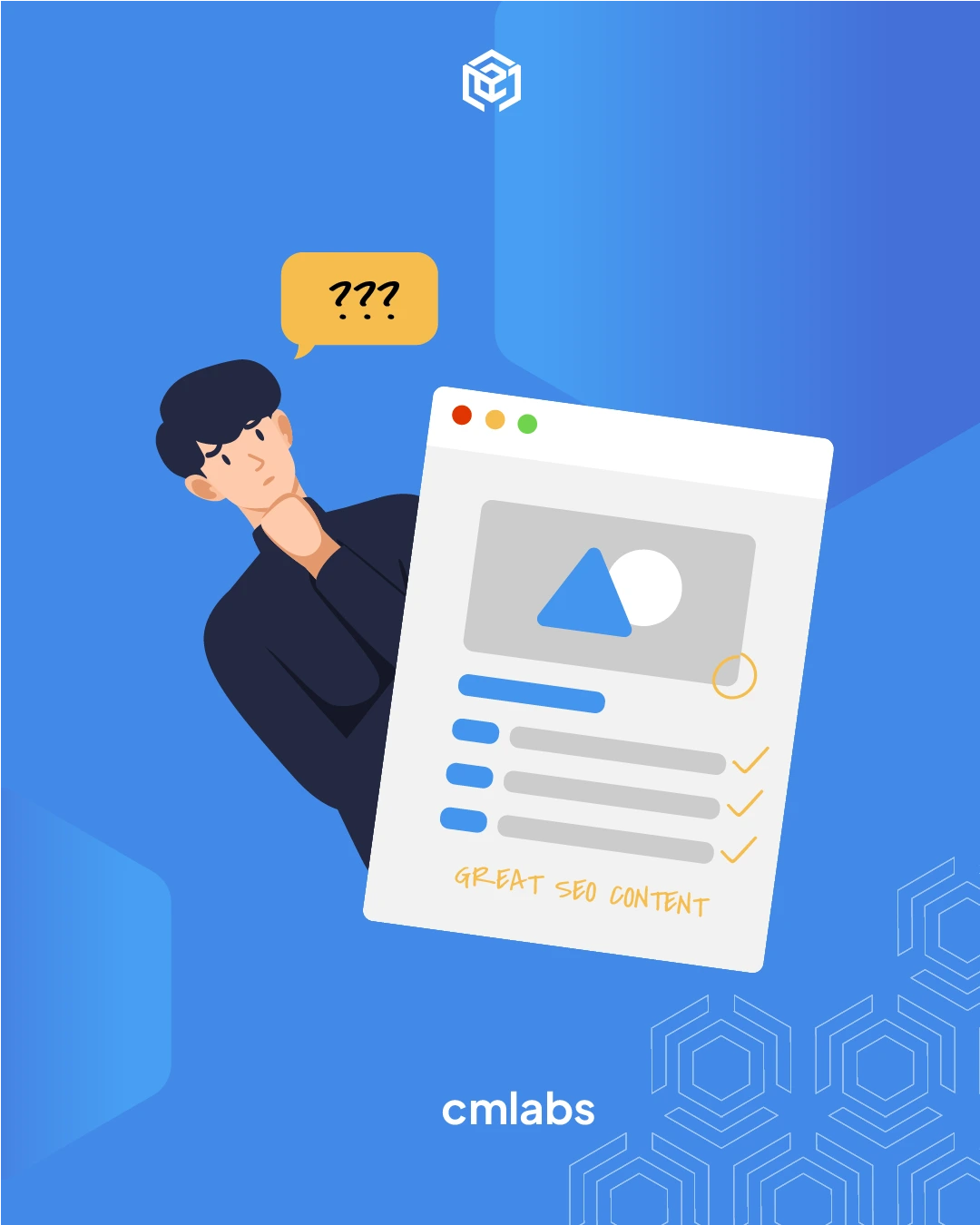We use cookies
This site uses cookies from cmlabs to deliver and enhance the quality of its services and to analyze traffic..
SEO SERVICES
Conduct in-depth technical website audits, strategically develop website projections, and increase your website authority.
ASO SERVICES
Elevate Your App’s Presence with Our Expert ASO Services – Boost Visibility and Drive Downloads!
WRITING SERVICES
We offer a variety of writing services to suit different business necessities. Reach broader audiences or lead specific industries? We've got you covered!
SEOlutions
A unified source of truth!
SEO & Digital Maternity Solution
SEO & Digital Maternity Solution: Leverage Cross-Platform Insights to Elevate Your Strategy with Expert Consultation
SEO & Digital Maternity Solution
Data Solution options:
Starting from Rp200 mio
Reinventing how a company get creative treatments
A new way to get your creative needs done. Agile team, efficient cost, and expedient way in a flexible yet scalable subscription plan!
Creative-as-a-Services
CaaS package options:
Based on Subscription
Pioneer in digital marketing software powerhouse
We’re excited to unveil our new range of Tech Solutions designed to drive your digital success. Whether you’re looking to enhance your website’s performance, streamline your tech stack, or unlock deeper insights from your data, we’ve got you covered.
Starting from Rp250 mio
Our Clients
Research and innovation center for digital transformation
Digital marketing combines technical skills and business knowledge at every stage. For marketing teams, improving budget management efficiency is crucial, as time is an invaluable resource that should be used wisely. At Sequence, we are dedicated to empowering you to optimize efficiency and strategic planning, ultimately enhancing the impact of your digital marketing efforts.
Subscription-based (IDR1,800/keyword)
Our Clients
BeyondSEO
References
SEO Tools for Webmasters
SEO Tools for Writers
SEO Tools
FIND THE SUITABLE PARTNERSHIP FOR YOUR COMPANY
Check out which cmlabs partnership program suits your company
WHITE LABEL SEO
for CorporateYour company is granted exclusive partnership rights to provide SEO services to our important clients, and we will provide a dedicated backend team to support your efforts.
AFFILIATE PROGRAM
for BizdevA new affiliate program is being introduced for skilled marketers and individuals with strong networks, offering commissions of up to 7% for generating profits independently.
DIGITAL AGENCY
for Marketing Partnerscmlabs is an essential partner for digital agencies, providing a unique selling proposition in Search Engine Optimization (SEO).
BACKLINK PARTNERSHIP
for Media / BloggerWe have a vast database of bloggers and media outlets across Indonesia, categorized by region and media type, giving our clients an edge in managing their media and SEO activities.
OFFICIAL TRAINING
We provide ongoing professional development and support to SEO professionals to ensure they are equipped to meet market demands.
JOIN AS CONTRIBUTOR
for Content WriterGreat opportunity for SEO Writers around the world. T&C applied!
ACADEMIC PARTNERSHIP
Through partnerships with universities in Indonesia, cmlabs has helped align academic curricula with industry demands.
Partnership
Sector & Industries
Tell us your SEO needs, our marketing team will help you find the best solution
As an alternative, you can schedule a conference call with our team
Schedule a Meeting?Contact
Survey
We use cookies
This site uses cookies from cmlabs to deliver and enhance the quality of its services and to analyze traffic..
Last updated: Jul 17, 2024
Index bloat is a problem you need to be aware of as it can result in excessive database indexes that do not match the actual data referenced.
This problem can affect the website because search engines will consider it irrelevant and low-quality.
However, you don't need to worry about this problem because there are various ways to fix it. Before that, let's learn more about it first.
Index bloat is a term used to describe the inefficiencies and mismatches in database indexing that can adversely affect website performance.
Essentially, it refers to the presence of excessive and redundant index data that is not aligned with the actual data in the database.
This misalignment creates a scenario where search engines and database management systems have to work harder and longer to retrieve the necessary information, leading to slower query responses and degraded overall system performance.
Index bloat can be harmful as it can affect how well a website database is managed, how efficiently it is used, and how much it costs.
When your index gets too big, it can slow down your website, use a lot of disk space, and make your backups and restorations take longer.
Since mismatched indexes can have a significant impact on your website, then you should consider them and put plans in place to avoid them.
If you are struggling or facing this problem, you should know there are a few things that are causing this mismatch indexing, such as:
URL errors, problems with server configuration, and problems with the content management system commonly cause this unintentional page duplication.
Naturally, robot.txt can help search engines select pages on the website. However, errors may also be encountered in robot.txt. Therefore, it is a good idea to perform regular checks to ensure that it is functioning correctly.
One example of page adjustment is when you create a long article. It is necessary to connect one page to the next.
If it's not connected properly, search engines can misindex the next page as separate content and display it as an irrelevant truncated section.
Ensuring that all parts of a website have clear goals and objectives is crucial for the effective delivery of information to users.
When a website's content is well-organized and relevant, users can easily find what they are looking for, and search engines can efficiently index the site.
However, the presence of irrelevant content can significantly disrupt this process and lead to a variety of problems, including index bloat.
An effective method for detecting index bloating is to use a specialized tool called Google Search Console. These tools facilitate visualizing the number of indexed pages and identifying irrelevant pages.
If you look at the difference between the number of pages the search engine indexes and the number that should be in the database, you can see where there are problems.
If the number of indexed pages is significantly different from what it should be, you need to make some corrections.
Here are some recommended steps that can help you to fix index bloating:
The correct and appropriate use of robots.txt and meta tags such as "noindex" can be your key strategy to minimize the occurrence of indexing mismatches. Robots.txt and meta tags can help search engines index relevant pages on your website.
An organized website and appropriate internal links can help search engines navigate to relevant and targeted pages. This will also help improve the user experience and visibility of your website.
Regular monitoring and cleaning is an important thing you can do to keep your website index under control while making it easier to eliminate low-quality content.
You can use canonical tags to prevent duplication of content by signaling and helping search engines select the main page to index.
Optimizing dynamic pages needs to be done by implementing proper indexing and data management. As an additional effort, you also need to perform regular maintenance.
Conclusion
Index bloating is a problem that can occur at any time on your website and can be detrimental, so it must be prevented.
Several methods can be used to address this issue, including implementing robot.txt, meta tags, canonical tags, optimization of site structure, dynamic pages, and regular monitoring.
WDYT, you like my article?
Couldn't find result for "Mulki" try to search with different keyword
Suggestion:
Tell us your SEO needs, our marketing team will help you find the best solution
As an alternative, you can schedule a conference call with our team
Schedule a Meeting?



cmlabs Jakarta Jl. Pluit Kencana Raya No.63, Pluit, Penjaringan, Jakarta Utara, DKI Jakarta, 14450, Indonesia
(+62) 21-666-04470These strategic alliances allow us to offer our clients a wider range of SEO innovative solutions and exceptional service.

Psst! Hey there, SEO Stats and Tools SEO company! If you've ever planned of conquering the United Kingdom market, you've come to the right place!